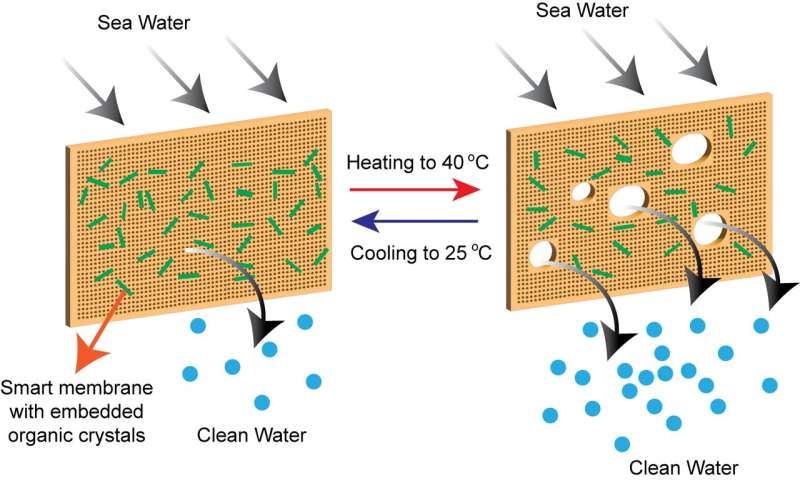
Smart membrane function. Credit: NYU Abu Dhabi
A team of NYU Abu Dhabi (NYUAD) researchers has developed a new kind of self-cleaning, hybrid membrane that provides a solution that overcomes significant challenges that have, until now, limited desalination technologies.
The most energy-efficient desalination technologies are based on membrane desalination. However, the membranes used for desalination are prone to fouling, the accumulation of scale that results in decreased membrane performance, shorter lifespan, and the need for chemical cleaning, which has unknown environmental consequences.
Researchers at NYUAD’s Smart Materials Lab and the Center for Smart Engineering Materials, led by Professor Panče Naumov and Research Scientist Ejaz Ahmed, together with their collaborators from the Institute for Membrane Technology in Italy, created a unique hybrid membrane by utilizing stimuli-responsive materials, thermosalient organic crystals, embedded in polymers. The thermosalient crystals are a new class of dynamic materials that are capable of sudden expansion or motion upon heating or cooling.
Combining these microcrystals with traditional, porous membranes, the researchers developed a “smart” membrane capable of deformation by self-modulating its pore size and surface properties in response to changes in temperature. The crystals on the surface of the membrane respond to short-term increase in temperature, which activates the membrane to effectively remove the deposited contaminants from its surface.
The researchers found that this “gating” process increased the flow of desalinated water by more than 43 percent through osmotic distillation and significantly extended the membrane’s operational lifetime.
The findings are presented in a paper titled “Smart Dynamic Hybrid Membranes with Self-Cleaning Capability,” published in the journal Nature Communications.
The ability of hybrid membranes to self-clean and minimize fouling could make desalination technologies more efficient and could increase the availability of freshwater. More than a third of the world’s population currently suffers from shortages of drinkable water, a number expected to reach 50 percent by 2025. In water-deficient countries, such as those in arid regions like the MENA region, membrane desalination of seawater helps coastal communities address local deficiencies.
“There is an urgent need for energy-efficient membranes capable of water desalination and other separation technologies that eliminate fouling issues without utilizing harsh chemicals as cleaners,” said Naumov.
“The hybrid membrane we have developed demonstrates favorable consistency in performance after several cycles of descaling. With more than twenty types of dynamic organic crystals available to use with different membrane compositions, our novel approach represents an important step forward towards the development of a new generation of ‘smart’ membranes that will be capable of self-cleaning in an energy-saving and environmentally benign manner, which will effectively improve the cost-effectiveness of the overall process of potable water production.”
More information:
Elvira Pantuso et al, Smart dynamic hybrid membranes with self-cleaning capability, Nature Communications (2023). DOI: 10.1038/s41467-023-41446-9
Citation:
New self-cleaning membranes developed by researchers dramatically improve efficiency of desalination technologies (2023, September 20)
retrieved 20 September 2023
from https://phys.org/news/2023-09-self-cleaning-membranes-efficiency-desalination-technologies.html
This document is subject to copyright. Apart from any fair dealing for the purpose of private study or research, no
part may be reproduced without the written permission. The content is provided for information purposes only.
>>> Read full article>>>
Copyright for syndicated content belongs to the linked Source : Phys.org – https://phys.org/news/2023-09-self-cleaning-membranes-efficiency-desalination-technologies.html










